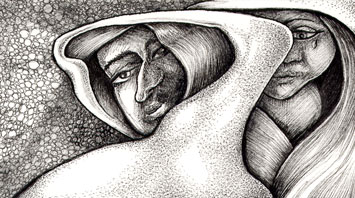MUNICH
Dir: Steven Spielberg
As a
young teenager, Steven Spielberg's parents were divorced, and in a way, the
United States' most famous director has been putting families back together,
onscreen, ever since. But while his predilection for happy endings has earned
the gifted storyteller countless millions, it has also garnered the technician
the reputation of sentimentalist, or even, Peter Pan. And while thematically
weighty films such as Schindler's List, and darker fare like Minority Report,
have lessened the accusations of late, they've done nothing to change the fact
that Spielberg often, especially in these more experimental films, can lose his
nerve by the film's second hour. Simply put, regardless of the film's
convictions, Spielberg seems unable to resist a feel-good closer. Witness the
recent War of the Worlds, in which Tom Cruise finds his ex-wife, his in-laws,
and both children, aliens be damned!
All
of which makes Munich remarkable.
The
film is a triumph for Spielberg, a taut revenge thriller as entertaining as
Jurassic Park, with a beacon of painful truth as brilliant as his T-Rex was
terrifying. A sad commentary on one of the most galvanizing quagmires of our
generation, if not human history, Munich manages not only to eschew blame, but
supersede it. In essence, the film is a treatise on violence -- well on par with
Cronenberg's haunting contemporary film A History of Violence -- illustrating
wonderfully the traumatic journey a soul can make when faced with senseless
destruction. And not simply a soul: A family, a community, society at large.
"Every civilization finds it necessary to negotiate compromises with its `own
values'," according to the film's trailer. The line is apropos thematically, but
there is a better one hidden deep within the film's first hour. "We are in a
dialogue now," one Israeli assassin explains to another, in describing the
ongoing violence against Palestinians. He at once renders an unforgettable aural
image of the rent between two peoples who were once one, and conveys the
thematic crux of this Spielberg masterwork.
Beginning with the documentary-like images of Black September, Spielberg
and his crew paint a picture of the fateful Munich Olympics of 1972, as well as
an imagined aftermath of the traumatic events. "Imagined" is the essential word
here: the film has been both lauded and attacked for claiming to be inspired by
true events. Following the Munich massacre, the Israeli government hires
everyman Avner (Eric Bana) to lead a band of assassins in revenge. "We have 11
Palestinian names. Each one of them had a hand in planning Munich. We want them
all dead," instructs the shadowy Ephraim (Geoffrey Rush). With those words, he
places father-to-be Bana, along with four other Jews, on a course of all-out
vengeance. The paradox? What at first seems as simple as anger quickly becomes
as labyrinthian as love.
Avner is the centerpiece of the film -- the moral compass, to borrow a
cliché. Bana's portrayal is neither showy, like Philip Seymour Hoffman's in
Capote, nor blindingly subtle like Heath Ledger's in Brokeback Mountain, but
poignant in its simplicity. His is a character not crushed by the weight of his
actions but bearing up under it ounce by ounce, the strain increasingly apparent
in his ever-darkening eyes. As Avner struggles with the growing moral
responsibility of his actions, his qualms manifest themselves, quite literally,
in the lives of his compatriots: vehicles expert Steve (Daniel Craig),
bomb-maker Robert (Mathieu Kassovitz), counterfeiter Hans (Hanns Zischler), and
clean-up man Carl (Ciaran Hinds). Together the five travel the globe in search
of terrorists, struggling with the uncomfortable likelihood they've become
terrorists themselves.
This
ambiguity is made visually apparent by Janusz Kaminski, in his ninth turn as
Director of Photography for Spielberg. The cinematography is masterly: scenes
slowly recede in clarity, from the burnt-out whites of desert sun to the foggy
grey of European rain. True, the film is buoyed by the rollicking script of Tony
Kushner and Eric Roth, but it is Kaminski's photography and John Williams' score
that elevate it emotionally. In bald contrast to his usually bombastic
creations, Williams delivers a quieter score. Most notable is a devastating
refrain that incorporates the sounds of helicopter blades like those that
splintered the night at Munich. The score seems to haunt Avner's dreams as well
as the viewers'.
Still, it is Spielberg's conviction that guides every moment. Like his
hero, the director has faced down Hollywood demons, managing not to lose himself
in the process. Munich begins to reveal the depth of his newfound maturity. For
as much as the film dwells upon the sadness of division, it is not a story of
divorce. Though there will likely be no marriage between the Israeli and
Palestinian people, Avner in the end does discover common ground. Munich offers
up no Neverland, no happy ending, but it is a step in the right direction. It is
Spielberg growing up.
